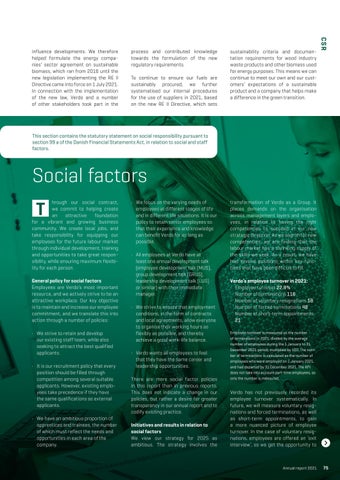process and contributed knowledge towards the formulation of the new regulatory requirements. To continue to ensure our fuels are sustainably procured, we further systematised our internal procedures for the use of suppliers in 2021, based on the new RE II Directive, which sets
sustainability criteria and documentation requirements for wood industry waste products and other biomass used for energy purposes. This means we can continue to meet our own and our customers’ expectations of a sustainable product and a company that helps make a difference in the green transition.
CSR
influence developments. We therefore helped formulate the energy companies’ sector agreement on sustainable biomass, which ran from 2016 until the new legislation implementing the RE ll Directive came into force on 1 July 2021. In connection with the implementation of the new law, Verdo and a number of other stakeholders took part in the
This section contains the statutory statement on social responsibility pursuant to section 99 a of the Danish Financial Statements Act, in relation to social and staff factors.
Social factors T
hrough our social contract, we commit to helping create an attractive foundation for a vibrant and growing business community. We create local jobs, and take responsibility for equipping our employees for the future labour market through individual development, training and opportunities to take great responsibility, while ensuring maximum flexibility for each person. General policy for social factors Employees are Verdo’s most important resource, and we actively strive to be an attractive workplace. Our key objective is to maintain and increase our employee commitment, and we translate this into action through a number of policies: • We strive to retain and develop our existing staff team, while also seeking to attract the best qualified applicants. • It is our recruitment policy that every position should be filled through competition among several suitable applicants. However, existing employees take precedence if they have the same qualifications as external applicants. • We have an ambitious proportion of apprentices and trainees, the number of which must reflect the needs and opportunities in each area of the company.
• We focus on the varying needs of employees at different stages of life and in different life situations. It is our policy to retain senior employees so that their experience and knowledge can benefit Verdo for as long as possible. • All employees at Verdo have at least one annual development talk (employee development talk (MUS), group development talk (GRUS), leadership development talk (LUS) or similar) with their immediate manager. • We strive to ensure that employment conditions, in the form of contracts and local agreements, allow everyone to organise their working hours as flexibly as possible, and thereby achieve a good work-life balance. • Verdo wants all employees to feel that they have the same career and leadership opportunities. There are more social factor policies in this report than in previous reports. This does not indicate a change in our policies, but rather a desire for greater transparency in our annual report and to codify existing practice. Initiatives and results in relation to social factors We view our strategy for 2025 as ambitious. The strategy involves the
transformation of Verdo as a Group. It places demands on the organisation across management layers and employees, in relation to having the right competencies to succeed in our new strategic direction. As we search for new competencies, we are finding that the labour market has a shrinking supply of the skills we seek. As a result, we have had several positions within key functions that have been difficult to fill. Verdo’s employee turnover in 2021: • Employee turnover 22.8% • Number of terminations 116 • Number of voluntary resignations 58 • Number of forced terminations 48 • Number of short-term appointments 21 Employee turnover is measured as the number of terminations in 2021, divided by the average number of employees during the 1 January to 31 December 2021 period, multiplied by 100. The number of terminations is calculated as the number of employees who were employed on 1 January 2021, and had departed by 31 December 2021. The KPI does not take into account part-time employees, as only the number is measured.
Verdo has not previously recorded its employee turnover systematically. In future, we will measure voluntary resignations and forced terminations, as well as short-term appointments, to gain a more nuanced picture of employee turnover. In the case of voluntary resignations, employees are offered an ‘exit interview’, so we get the opportunity to
Annual report 2021
75
